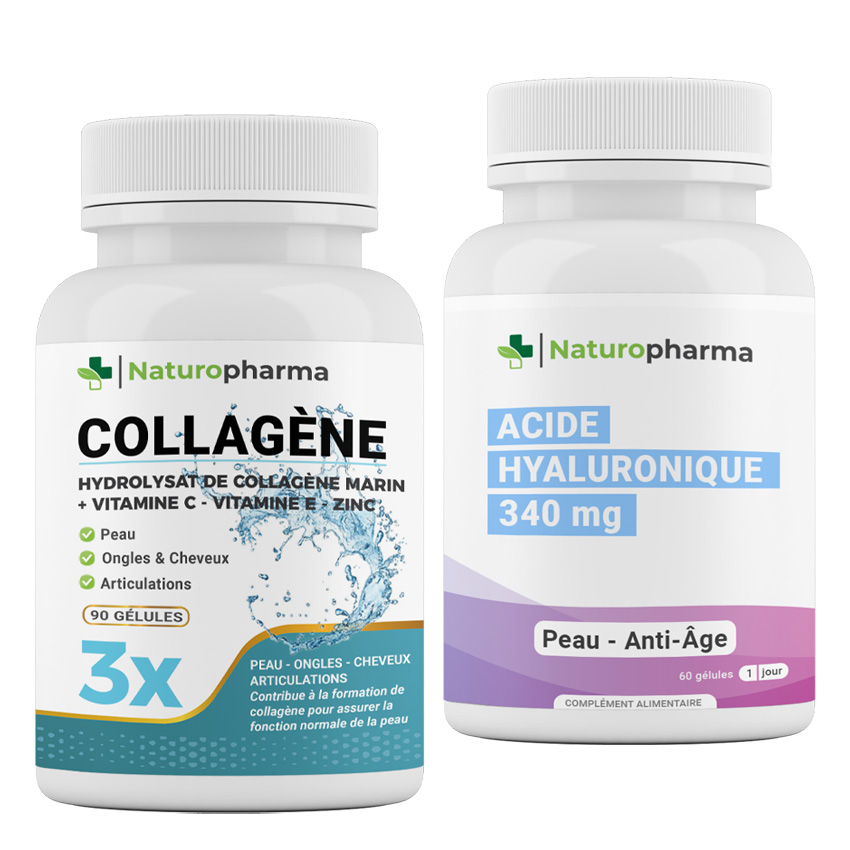When it comes to the health and well-being of our skin, bones and joints, hyaluronic acid has become a key ingredient in many treatments and skincare products. But why is everyone talking about it? Why is it so popular? And how can this natural ingredient help repair our tissues? In this article, we'll dive into the details of hyaluronic acid to understand why it's so effective for tissue repair and how we can incorporate it into our skincare routine to get the most out of it.
What is thehyaluronic acid ?
Hyaluronic acid is a molecule naturally present in our bodies. It is a member of the glycosaminoglycan family, made up of complex sugars which, as well as being an essential part of our skin, are also found in our joints, eyes and connective tissues. These molecules are responsible for the hydration and elasticity of our skin, as well as the lubrication of our joints.
Hyaluronic acid is often compared to a sponge, as it has the ability to retain up to a thousand times its weight in water. This moisturising property makes it an essential ingredient for keeping our skin smooth, supple and youthful. As we age, our natural production of hyaluronic acid decreases, which can lead to loss of volume, fine lines and wrinkles.
How does hyaluronic acid help repair tissue?
One of the main roles of hyaluronic acid is to facilitate the repair of damaged or aged tissue by stimulating the production of collagena protein essential for the structure and elasticity of the skin.
Collagen is produced by fibroblasts, cells found in the skin which are also responsible for producing hyaluronic acid. By adding hyaluronic acid to our skin, we increase the stimulation of fibroblasts to produce collagen and other components of the extracellular matrix. This increase in collagen production helps to repair skin damage, such as wrinkles, fine lines, dark spots and scars.
Hyaluronic acid also has anti-inflammatory properties, making it a useful ally in the fight against inflammatory diseases such as arthritis. By reducing inflammation, it helps to relieve pain and stimulate the regeneration of joint tissue.
How should hyaluronic acid be used to maximise its benefits?
Hyaluronic acid can be used in a variety of ways, both topically and by injection. The choice will depend on your specific needs and preferences.
When used topically, hyaluronic acid can be applied as a cream, serum or mask. It can also be combined with other ingredients beneficial to the skin, such as vitamin Cglycolic acid and salicylic acid. These combinations can help improve skin texture, lighten dark spots and reduce the signs of ageing.
In addition, hyaluronic acid can be used as an injection to target specific areas of the face, such as the lips or cheeks. The injections supply the tissues with hyaluronic acidThis can increase their volume and hydration, giving the skin a more youthful, plumper appearance.
Many cosmetic brands have also started to include hyaluronic acid in their skincare products, from hand and foot creams to lipsticks and foundations. This means that, even if you don't want to resort to injections or serums, you can still benefit from the restorative properties of hyaluronic acid simply by incorporating these products into your daily routine.
Hyaluronic acid: a solution for everyone?
Although hyaluronic acid is a safe and effective ingredient for tissue repair, it may not be suitable for everyone. Sensitive skin can be allergic to this ingredient, so it's important to always test a small area of skin before using it on the whole face.
In addition, pregnant or breast-feeding women should consult their doctor before using products containing hyaluronic acid, as there are insufficient studies on the effects on the foetus or baby.
Conclusion
Hyaluronic acid is a powerful ingredient with numerous benefits for tissue repair. By supplementing our natural production, it can help stimulate collagen production and reduce inflammation, while providing intense hydration for younger, plumper skin.
Whether you choose to use it as a cream, serum or injection, it's important to always choose quality products and to consult a healthcare professional before using it, if necessary. With regular and appropriate use, hyaluronic acid can be an effective solution for repairing damaged tissue and improving the health of our skin, bones and joints.
Recommended products
Hyaluronic Acid
Original price was: 23,00 €.19,90 €Current price is: 19,90 €. (-13%)Collagen + Hyaluronic Acid
Original price was: 47,00 €.42,90 €Current price is: 42,90 €. (-9%)












